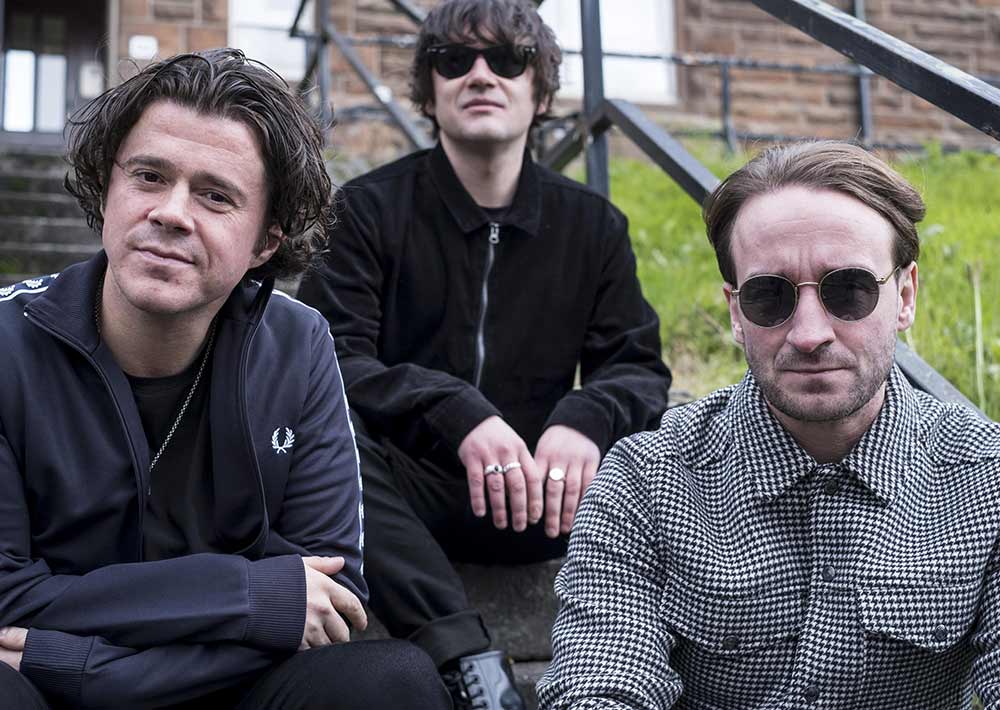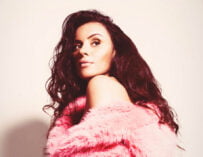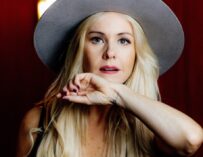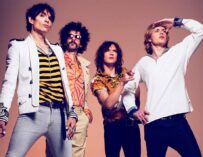
Kyle Falconer: “I didn’t know what I was saying half the time. I’d look at it and I was like, ‘That’s quite profound.’”
Love, loss, and nostalgia – The View’s frontman reflects on his most personal songs and the women who inspired them
Jolene, Valerie, Roxanne, Layla, Stan, Fernando, Delilah… there’s something about a name that can bring a song to life and anchor it in the hearts of listeners. For Kyle Falconer, names have been a constant presence in his songwriting, both as frontman of The View and in his solo work. The ability to turn the deeply personal into timeless tunes has earned him chart-topping success, a dedicated fanbase, and awards – including the prestigious King Tuts’ Songwriting Award at the Scottish Music Awards.
From the swaggering Claudia on The View’s No 1 debut album Hats Off To The Buskers to the soul-bearing solo song Laura, Falconer has long used names to breathe life into his songs. His latest album, The One I Love The Most, reimagines this tradition – bringing together two decades of songwriting, all centred around the women who have shaped his life and music. With reworked acoustic versions of fan favourites and new single, Angelina, the album is both a celebration of his past and new insight into his songcraft.
We had the chance to speak to Falconer from his Spanish base La Sierra Casa – the home to his songwriting camps and a state-of-the-art studio – where the new album was recorded…
More interviews with songwriters
Where are you today?
“I’m in Spain. We’ve been here for six months and we’ve just bought a house, so we’re waiting to move into that. We’re in the middle of nowhere, it’s quite isolating. But I have people back and forward all the time… always different writers.
“It’s a bit strange because everyone that comes are kinda on their holidays. I’ve been doing a lot of work with rappers and more urban music. I’ve been working on computer games, loads of different things… I’ve always got totally different sides of the spectrum and it’s versatile writers from every angle. It’s pretty crazy.”
Are you someone who’s always writing, or do you have to block out time to do it?
“The calendar’s filled up all the time. I’m actually working on a new album that’s hopefully going to be out for August. I’ve got the new solo record as well, but that’s a look back on my other projects, and I’ve been wanting to do it for years – acoustic versions of all the girls’ names. I never realised I had so many girls that I was writing about.
“Having the studio here and having my business partner over here, Michael Ward… he’s been taking on more management of the whole thing. It’s good releasing it ourselves and going through the whole thing, we’re testing the water to see how we would do it, because we started a label, and we’re looking at doing a publishing company.
“Everything’s getting off the ground. We’re using Republic of Music, and it’s good to see how it’s all set up, you don’t usually see the ins and outs of it, but we’re doing it from scratch.”
Is it harder or easier than you thought it would be?
“To be honest, the recording part is my job and my business partner Wardy, he’s doing all the hard stuff. I’ve got another baby on the way, my wife’s pregnant with our fourth kid. It’s just trying to juggle all that while I’ve got a gang of rappers in the house, but it’s quite good because the house has lots of different areas.
“The other week we had five rappers/producers. They were all sleeping in the studio, because I’m trying to keep everyone away from the kids and make it more of a work thing. But it’s great, it’s so creative. At the same time, I’m looking forward to getting my place up the road. I always thought I’d love to have a studio in my house, but it’s a bit full on. I feel guilty when I’m not writing or recording, because I feel like I should be doing all the time”

Kyle Falconer: “I never used to co-write at all… Now I’ve been writing with everyone.”
With The One I Love Most, did you have a lot of songs that you then had to whittle down?
“That was all the girls’ names. I had song titles like Mother and stuff, and I was going to dedicate it to women. But then it was all the girls’ names. The first one I remember writing was Claudia and that was about my dog that died. I was the only one of the family she didn’t like and I started putting that into songwriting. When I was at school, people were trying to figure out who Claudia really was. It was just about my dog, but nobody believed us.
“Then there’s other songs, like Kelly. I wrote that when I was in rehab. One of my trans friends was called Luna. I never knew anything about trans women at the time, and it was an eye opener for me. We became best friends and that was what the song Kelly was based on.”
Working on them again must have brought back memories of writing them?
“When Claudia was written, that was when I first started playing the guitar and it was wearing my heart on the sleeve and it was dead simple. It’s hard to get back to that. Those origins of not even knowing what love really was, and just fantasising about it. That’s the beauty of going back, because that was probably the most honest song. I think now, everyone’s so judgmental and you’ve got to watch what you’re saying.
“Also, I never used to co-write at all… Now I’ve been writing with everyone. When we do the camps, we’ve got like 30 folk here, and it gives you a different perspective on writing.
“It’s good to look back on it and see how innocent the songs were. I didn’t know what I was saying half the time. I’d look at it and I was like, ‘That’s quite profound.’ Now you struggle to get your point across… All these songs are written on guitar, so that’s why I wanted to go back and put them just for guitar and piano.”
Were you tempted to fix any lyrics?
“There is bits that are fixed, lines that I’ve changed when I sing them live, that I always think I should have sung. I remember singing them and Drew [Palmer], my guitarist, was going, ‘That’s not the right line. That’s not what’s on the record.’ I went, ‘No, but that’s what I sing live, so I’m just going to do it.’
“The whole thing started out because we wanted to test what the studio was like. My friend Kris Evans, he’s a rap producer, came over. He’d never really worked with guitars or pianos, so it was quite cool because we were teaching each other stuff, and he was engineering it.”
Could you see a change in your writing through those 13 songs?
“I can see that there is a difference in the songwriting, but they’ve still got the bare bones. I get a wee bit sadder as time goes on. A few of the songs are before I lost my mum when I was 21. My dad died when I was 16, and I remember trying to use that pain, but we were in a band when I was 17, and we got really big, and I was just happy to be alive.
“I always remember feeling guilty that I was happy and I was away. I moved to London when I was 18 and left my mum, and then I lost her. The song Madonna (originally called Madonna’s Make Up), that’s about imagining what my mum and dad would be like in heaven and all their favourite stuff.
“That one is weird because I don’t actually mention Madonna in the song, it’s Marilyn Monroe. I remember, at the time I wrote it down on my eight-track, and it was saved. It was another night that I was pissed up and then I was like, ‘What did I get up to last night?’ and I pressed play and it was Madonna’s Makeup.
“I was like, ‘Why did I it call Madonna’s Makeup?’ It goes, ‘Marilyn’s gonna do your makeup/And Michael’s gonna teach you to dance/And Brando’s gonna give you film tips in a hurry…’ It’s about my mum and dad’s love and passion, but it always stuck, Madonna. It’s one of those things, like the Mandela Effect. Madonna’s not mentioned once in it, but I even think it’s in the song and I imagine Madonna’s face every time I play that song.”

The View. Kyle Falconer: “I’d never thought of myself as a songwriter or even a musician. It was just a party to me.”
Are there any other tracks you can tell us about?
“Grace was about Pete [Reilly]’s next-door neighbour that used to threaten him and get all these hard guys up to his house, because he was having all these parties. I remember showing that to the label and being like, ‘I’ve got this rock and roll song but I don’t like the chorus.’ So I had to go away and write one. At the time I was going through a lot of shit with alcohol, and she was like, ‘You need to stop drinking in there.’ So I was like, ‘I’m a sober boy/you’re a lonely girl/let’s give it up/and stay out of each other’s words.’ “I remember thinking, ‘I’ve got it.’
“To answer your earlier question, I think the songs get a bit more deep. Lilly Anne is about… I was banned from America for six years. I couldn’t get back in until Mark Ronson, who I started touring with, got Quincy Jones to write a letter to the American government. I got back into America, but I missed all the big TV shows, like Jimmy Fallon. I was meant to be playing them and I couldn’t get over and it was really horrible.”
And that inspired the song Lilly Anne?
“When I finally did get back, I went over to LA for a month and brought my eight-track on my back. This was about 2014, everyone else was using laptops at the time. Lilly Anne is meant to be Los Angeles, another name. ‘Dear Lilly Anne, I’m writing to say/I feel so honoured you’ve asked me to stay.’ When I got back in America, I was going to kiss the ground, and I did, because I’d always felt like I was missing out. We were No. 1 over there, on college radio. It was kicking off, and we sold out gigs everywhere, like 3,000 cap a night, but then we got told we couldn’t come.
“That kind of ruined our career and I always felt really sad about it. But I always feel like, if that never happened, I wouldn’t have had my kids, I wouldn’t have met my wife. Everything happens for a reason. I probably would have went crazy on the drugs and the drink over there. I feel like it was a blessing in disguise.
“I’ve always had this love for America and I’ve still got a lot of friends to write with over there, like Alex Greenwald from Phantom Planet – I write a lot with him. I’ve been writing some stuff with Babydaddy from Scissor Sisters, all these mad guys. I’d never realised how much of a job it is. I’d never thought of myself as a songwriter or even a musician. It was just a party to me, always, and I loved the feedback I got off the fans. But you go over there, and it’s an actual job. It’s like, ‘Okay, we’ve got a session at ten and a session at twelve.’
“Some people are really snooty about it. I like to set the mood, chill, have a beer, everyone go for a swim before we do anything, go and play football or go up the mountains and run. Not like, ‘We need a chorus!’ I really like to get to understand people’s emotions first, before I do it.”

The View. Kyle Falconer: “[My sister] was always like, ‘Always remember, put a girl’s name in a song and it will sell, because there’s a million people called that.’
“Angelina was written about twelve years ago, it was a View demo. When we were working with Youth on our album Bread And Circuses, I was out one night and recorded this at one of my friend’s houses. I was smashed and I was obsessed with this song that was dead dark. It was called Where Do We Stand. I couldn’t really think of what I was talking about, because I was so twatted when I was writing it. It was quite haunting, and I played it on the guitar to Youth and he sent it to Oli Cross and he mimicked the guitar parts on the strings and sent it back.
“I was trying to get in touch to use it for this album. We used AI to try and get all the string parts back out that we’d already recorded, because nobody had the files or the tapes from ages ago. Nobody knew where it was, but it had cost about 50 grand to get these strings done and I was like, ‘They’re no going to waste.’
“I changed the lyrics up. I rewrote the song and put it to Angelina. I was sitting one day and I really want to use that song. I went, ‘Wait a minute… Angelina.’ My daughter had started going to school and I think one of her pals was called Angelina. It used to be ‘Wherever we stand,’ but I changed it to, ‘Angelina.’ At the time, I’d split up with one of my ex-girlfriends, and I remember thinking it was really hard, I was using the heartache to try and talk about it. I remember it being quite heartfelt at the time, but I just sort of put in lyrics that fitted ‘Angelina,’ and I don’t even know anybody called Angelina.”
What is it about someone’s name that’s more evocative for you as a writer or the listener, to hang an idea or a lyric from?
“One of my sisters is a singer and years ago, she would always show me bands like Crowded House and Del Amitri. She would always really delve into the writing of it. One of my greatest things would be when she would sit and explain to me songs like Always The Last To Know by Del Amitri. I was always obsessed and she’d talk me through shit like that. She was always like, ‘Always remember, put a girl’s name in a song and it will sell, because there’s a million people called that.’ That always stuck in my brain.
“But it was a subliminal thing. It wasn’t like I sat and thought about it systematically. I just kept doing it, because I must have thought, ‘This is working.’ That was one of our big mistakes… we were always A-listed on the radio, and then they were like, ‘If you release Claudia, it’s going to get A-listed.’ And we were like, ‘Nah we’re releasing The Don because it’s more punk/rock and roll. We don’t need to conform to any of your ideas,’ and all this shit.
“So we’d done it, and then we got a ban from the radio because of the lyrics. That was a big mistake for us, not releasing that. But I remember thinking, I need another song like Claudia, and every time I would write another girl’s name.”
Any final thoughts on the album?
“I think it’ll be a fan favourite. When I play live, and I do my acoustic tours with my pal Drew, people get to hear the songs and have a singalong. It’s all the sing-along songs, there’s no boring songs. When I play live, when I’m jumping about like a maniac and I’ve got these big guitars behind us, I don’t really take into account what’s going on. I just see a big blur.
“When I do them this way live, sitting at a piano or whatever, I can see people sing along and it gives you something back. I start getting a revelation of what the songs even mean to me, and I’m like, ‘Woah, these are pretty cool.’ Even re-recording them again, it felt natural. It didn’t feel like a struggle. I just wanted to put the bare bones on them, the way they were originally thought of. So that was how it came about.”

































Related Articles